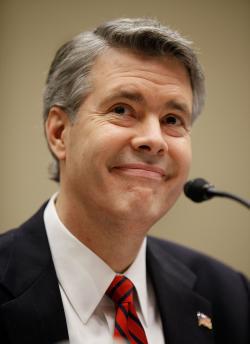FCC Commissioner Robert McDowell penned a warning about the potential for greater U.N. control over the Internet in a Wall Street Journal op-ed on Tuesday.
The United Nations is set to discuss Internet governance in Geneva on Feb. 27, which could lead to increased regulation of the Internet by the International Telecommunications Union. The ITU was established in the mid-1800s (it was originally called the International Telegraph Union) to regulate and facilitate international communication and became a U.N. agency established in 1947. McDowell holds that this would be a dangerous step toward censorship and cautions that it could inhibit Web innovation. Further, he claims that countries like Russia and China are looking to establish such Internet governance by the end of the year—and the effects would be disastrous:
A top-down, centralized, international regulatory overlay is antithetical to the architecture of the Net, which is a global network of networks without borders. No government, let alone an intergovernmental body, can make engineering and economic decisions in lightning-fast Internet time. Productivity, rising living standards and the spread of freedom everywhere, but especially in the developing world, would grind to a halt as engineering and business decisions become politically paralyzed within a global regulatory body.
McDowell’s words inspired a flurry of panicky tweets from people concerned about a world in which China has any say in the Internet of the United States. Some anti-SOPA activists not yet ready to do another battle against governmental encroachment on Internet freedom were particularly worked up.
A few tech sites, however, point out that McDowell is part of a government that has attempted major Internet regulation itself and that he is overreacting.
Boing Boing, one of the participants in the SOPA blackout, paints McDowell as a hypocrite. Cory Doctorow agrees that the Internet should not be regulated by government and that ITU oversight is dangerous. Yet he points out that Congress pushed SOPA, and the U.S. signed onto the Anti-Counterfeiting Trade Agreement. Doctorow also disagrees with McDowell’s depiction of the current state of Internet regulation as a “multi-stakeholder governance model.” Doctorow says,
McDonnell describes a present-day Internet where wise American stewards neutrally steer the net’s course. I see a world where political hacks and appointees from the lobbyist/regulator revolving-door are ready to destroy the Internet to maximize profits for one or another industry, and where an amok defense industry is ready to destroy whatever is left after Big Content gets through with its dirty work.
The Register, a tech news and opinion site based in Britain, points out that the ITU has previously stated that it will not attempt Internet regulation:
The ITU has said, time and time again, that it has no interest in running the internet. Earlier this month the organisation’s secretary general pointed out that even if he had a mandate (which he doesn’t) he hasn’t the budget. ITU budgets are always linked to policy objectives, and taking over the internet is not a policy objective.
The dangers of ITU intervention is a bit of a pet topic for McDowell, who published an earlier piece on the subject in the WSJ in July 2010.
